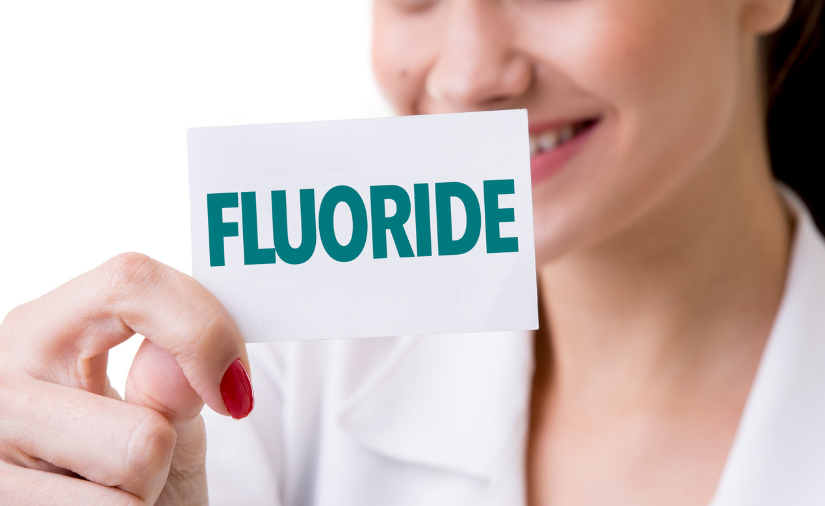By: Dr. Elizabeth Eggert
Ah, October… A month that simply wouldn’t be complete without candied apples, kettle corn, and literal buckets of Halloween candy!
It may strike you as ironic, then, that October is also National Dental Hygiene Month. In our opinion, though, the consumption of huge amounts of sugar makes October the perfect time to focus on oral health.
Far from taking the fun out of Halloween, Dr. Jeff and Dr. Elizabeth of Eggert Family Dentistry want to reassure you that even though your family may eat many sweets this month, you can count on a little mineral called fluoride to save the day.
What Is Fluoride?
Fluoride is a naturally-occurring mineral that plays an important role in dental health. Found in water, toothpaste, and mouthwash, fluoride strengthens the teeth, preventing cavities and even repairing early signs of tooth decay.
What Are the Benefits of Fluoride?
Fluoride works by penetrating the teeth and drawing in phosphate and calcium from your saliva. It aids the remineralization process, repairing teeth and strengthening enamel. It facilitates the creation of harder, larger enamel crystals that are more resistant to acid.
Fluoride also reduces the activity of the bacteria in your mouth. This leads to decreased acid production and less chance for tooth decay. Studies show that this miracle mineral can even repair early stages of tooth decay before things become a full-fledged cavity!
According to the CDC, the connection between fluoride and healthy teeth was recognized as far back as the late 1800s. By the 1930s, dentists observed that people who drank water containing naturally occurring fluoride seemed to be protected against tooth decay, or cavities.
Fluoride is beneficial for teeth because it helps to:
- Rebuild (or remineralize) weakened tooth enamel.
- Slow down the loss of minerals from tooth enamel.
- Reverse early signs of tooth decay.
- Prevent the growth of harmful oral bacteria.
Where Is Fluoride Found?
Fluoride is a naturally occurring mineral that originates in rocks. As the rocks break down, the mineral is released into the soil, air, and water.
As a result, trace amounts of fluoride can be found in many of the foods we eat, including grapes, raisins, wine, black tea, spinach, and potatoes. Fluoride is also found naturally in freshwater and saltwater. However, simply eating these foods and drinking freshwater won’t do much for your teeth—there’s simply not enough fluoride content within them to do the trick.
That’s where the other sources of fluoride come in:
You may recall having to sit with a tray of fluoride foam in your mouth during your childhood dental visits. These fluoride treatments fortified both your baby teeth and strengthened your adult teeth.
As an adult, you might receive a fluoride varnish during your recare visits, which serve the same purpose. And of course, there’s the fluoride-fortified toothpaste and mouthwash that can easily be found on store shelves. These items help you to protect your teeth at home in between dental visits.
Fluoridated Water
We’d be remiss if we didn’t talk about the fluoride in tap water and its role in protecting our teeth. It’s now common practice for cities to add fluoride to their water supply in a process known as water fluoridation. Starting in 1945, this practice began as a direct response to the observation that fluoride prevents tooth decay.
In the years that followed, the average number of missing or decaying teeth in American 12-year-old children dropped by 68 percent, according to the Centers for Disease Control and Prevention (CDC). This sharp drop followed the introduction and expansion of fluoridated water in communities, as well as the addition of fluoride to toothpastes and other dental products.
With so much success in improving the health and wellbeing of citizens, fluoridated drinking water is now heralded as one of the Ten Great Public Health Achievements of the 20th century.
(For more interesting fluoride trivia, be sure to check out our blog, “Fun Facts About Fluoride!”)
Risks Associated with Fluoride in Water
While there has been some controversy about the safety of fluoride in our water, the Environmental Protection Agency strictly regulates the amount of fluoride in community water supplies to keep it safe and healthy to drink.
If overexposed to fluoride, the main side effects are Dental Fluorosis or Skeletal Fluorosis. Dental Fluorosis occurs when you consume too much fluoride while your adult teeth are still developing underneath your gums. This will result in white spots on the surface of your teeth, but otherwise, the condition is harmless. (This condition is usually caused by swallowing too much toothpaste, so make sure you’re supervising your children while they brush.)
Skeletal Fluorosis is the same type of condition, except it involves the bones. It usually results from long-term fluoride overexposure. Symptoms of Skeletal Fluorosis include joint pain, stiffness, and—over the long-term—the calcification of ligaments. While this condition can be caused by swallowing toothpaste or mouthwash, it’s more often caused by drinking from a water source with unusually high levels of naturally-occurring fluoride.
Importance of Regular Fluoride Use
There’s no doubt that fluoride is nature’s cavity fighter. That’s why it’s important for everyone to use fluoride regularly, from childhood all the way through adulthood.
Fluoride treatments are especially helpful for children as their teeth are developing. When you start off with good oral health, it’s much easier to maintain into teenage years and young adulthood.
Fluoride treatments can also help adults with receding gums, adults who aren’t drinking city tap water, and adults with medical/oral health conditions or medications that cause dry mouth.
Want to Make Fluoride Treatments a Regular Part of Your Dental Hygiene?
At Eggert Family Dentistry, Dr. Jeff and Dr. Elizabeth and our magnificent hygienists will be happy to discuss incorporating fluoride treatments into your regularly scheduled dentist visits. If you want to learn more about the many benefits of fluoride or to schedule a routine visit, give us a call at 651.482.8412.

